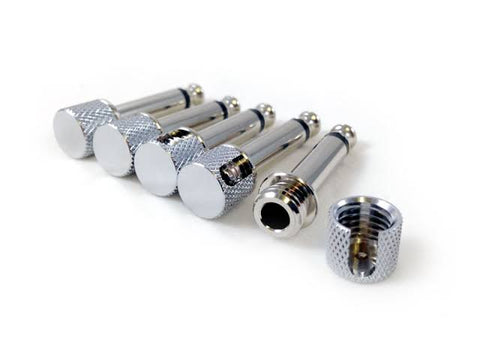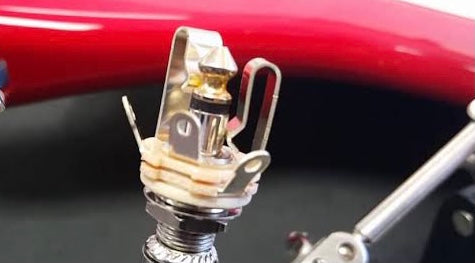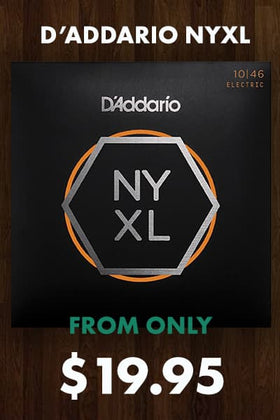
Soldered vs Solderless patch cables - Which is better?
This topic is hot again in 2021, but is it valid? There are many 'pro solder' flag wavers, ranging from old school, seasoned audio-electrical engineers, opinionated and coercive YouTubers, to young, wet-behind-the-ears pedalboard builders eager for recognition in the gear world.
To do this one justice we need to address a variety of points, which may be a touch arduous but i want to be thorough.
Different types of solderless cable
First things first, let's get a few things straight. Not all solderless cables are created equal. Without naming names, there are three main types of solderless. We'll call them 'Stranded Core A' 'Stranded Core B' and 'Solid Core'.
Stranded Core A

'Stranded Core A' is a cable usually made of high quality SPC (silver plated copper) strands for the audio signal, and a braided outer shield for the earth connection. Inside the plug head is a centralised pin, which imbeds amongst the strands to create a connection, then a set screw is screwed through the plug housing, piercing the cable and creating a ground in the braiding. That set screw is almost exclusively holding the cable together.
Here’s a link to this type of assembly we sell: https://www.pedalempire.com.au/products/evo-solderless-bulk-plugs-and-cable
Stranded Core B

'Stranded Core B' is quite similar in appearance to 'A' however the set screw design is replaced by a screw-on back for the plug. The pin connection is still used but the shield is instead exposed and folded back over the outside of the cable, creating an earth connection with the plug housing, while the screw-on back offers a stronger cable than one relying on the set screw alone.
Both 'A' and 'B' are somewhat cost effective compared to Soldered or Solid Core, but can be problematic.
No doubt, stranded core, solderless cables that will be plugged and unplugged regularly or be under any prolonged tension, may fail over time. The success of these cables will come down to how well they are assembled and how they are used.
Here’s a link to probably the most popular brand making this style: https://www.lavacable.com/product/540/lava-solder-kit-ra
Solid Core

'Solid Core' is exactly what it sounds like. A solid, pure copper core cable in place of the strands which is flexible but strong. Instead of a pin going into the cable, the solid core is exposed and screwed into the plug through a fine threaded hole that connects to the jack tip. The copper, being softer than the plug material (typically brass or brass alloy), creates a very tight connection, which IMHO is a superior connection in strength and reliability. Another plus is the way these cables hold shape when manipulated around a pedalboard.
So, in saying all of that, from here onwards in this article, when I say 'solderless' I'm referring to the 'Solid Core' variety as it is the most worthy revival to soldered cables.
This link is to our favourite solid core product: https://www.pedalempire.com.au/products/evidence-audio-patch-cable-kit-10-sis-plugs-and-10ft-of-monorail-cable
Gas Tight Connection
The contemporary buzz phrase for 2021, being thrown around in support of soldered cables, is 'gas tight connection'. But to really understand how this impacts your rig, we perhaps need a brief history lesson on the origins of solder itself.
Solder, though archaic forms of it have been around as early as the 5th century BC (in ancient Sumeria for example), had it's recent historical birth around the turn of the 20th century when the accelerated production of tin cans used an early soft solder technique to fuse tin and other alloys.
In the decades to come, a more refined form of soldering was widely used, joining copper piping in gas lines, providing a 'gas free' or water tight connection. In other words, no gas will leak from the pipes and be potentially hazardous.
Since then, this phrase has been borrowed and used in any and all industries that use soldering. However, from automotive, to HI-Fi, to industrial electronics, any mechanic or engineer will openly admit that a soldered connection will deteriorate over time due to the flux residue left behind which is hard to avoid and inevitably promotes corrosion.
So maybe pay less heed the next time you read 'gas free'. It's not some expert level soldering skill, that avoids any contaminants, and only the best builders are capable of performing. It's phrase that has lost part of its original meaning along the way. Unless you're soldering in an airtight environment (which, let's face it, nobody is) , there will always be stuff in your solder: sweat, dust, grime... etc. As I like to say about my successor and current Pedal Empire board builder extraordinaire, "There's a little bit of Paul in every cable he makes"!
Oxygen-Free Copper
Here’s another buzz phrase that, in my opinion along with many others, has been used in a somewhat misleading way particularly in the realm of pedalboards.
Oxygen free copper is copper that has been through a refining process. It’s submerged in an electrically charged solution of copper sulfate and sulfuric acid to reduce the oxygen content to somewhere in the vicinity of 0.001%.
Now, while this copper is most commonly associated with high-end audio equipment, that’s not what it was original made for. The true, wide spread use of OF copper is in the manufacturing of industrial generators where the wiring is constantly exposed to high temperatures and frequent vibration.
Oxygen Free Copper is also used in the production of scientific equipment such as electromagnets, superconductors and particle accelerators, where the absence of oxygen is often crucial to avoid chemical reactions with other components in these devices.
Now, don’t hear me wrong, the minimal oxygen content does improve conductivity, but you’ll notice that when this is referred to in an audio context the phrases used are ‘supposedly improves low frequency translation’ or ‘is believed to sound better’ etc etc, there is never a reference to actually evidence.
The auditory benefit would really only be noticeable if you were using in excess of 75 feet of cable, which I doubt many pedalboards out there do, not to mention that once you hit that first pedal your signal is undoubtedly passing through other material, making the whole endeavour pointless.
Lastly, it costs more than other less-pure copper cables. We honestly think it’s espoused to sound better to entice the tone aficionados out there into spending more money. It’s fine if you want to, but you should know the truth.
Here’s another article about OFC: https://www.cablewholesale.com/blog/index.php/2016/12/08/oxygen-free-copper-what-is-it/
Cold Weld Connections
Side step into the Hi-Fi audio industry. It's still a widely used process today to crimp wires together for speaker connections in sound systems. This crimping is sometimes called a 'Cold Weld' connection. This cold weld can be compared to the solid core screw in method which is arguable of similar quality. Many people prefer to use both a cold weld and a soldered connection for reliability, but neither one or the other provide superior sound quality.

Just stop and let that sink in... why would people someone spend $10000+ on a Hi-Fi system, and crimp the speaker wires, if it was affecting the sound? The answer is, it doesn't.
Here’s a link to more Cold Weld info: https://www.twi-global.com/technical-knowledge/faqs/what-is-cold-welding
Further more, there are multiple points inside your pedals where the signal passes through tiny printed tracks, or in some cases through socketed components that aren't soldered. Not to mention that once you plug a cable into a pedal, the jack is literally making a connection by pressing against the tip contact. Very much not a 'soldered', 'gas-tight', 'oxygen-free' (insert buzz phrase here) connection.

The Winner.....well it depends
Now side step one more time into our world of pedalboards. What is best for your tone? Asides from the steadfast opinion of some random redditor, or internet warriors swearing blind they can hear the difference in a Youtube video comparison (through their iPhone speakers no less), you will not find any clear evidence of a 'detectable lack in sound quality' between soldered or solderless cables. A spectrographic test may show slight differences, but I guarantee the human ear isn't even remotely sensitive enough to hear those anomalies.
I think by now you're starting to get the point. The choice between soldered or solderless cables really comes down to how you will be using or abusing them. The question of 'Will it sound better?' is somewhat null and void.
As mentioned above, a solderless cable that is assembled poorly, may very well sound worse, but that is a reflection on the assembler, not the quality of the product. Adversely, a full soldered board will almost definitely cost you more as the labour is more involved, unless you plan to do it yourself.
So, rather than list the positives and negatives, let's talk about three scenarios and the advantages of one cable over another in 'real world' applications.
The Three best options for your scenario
1. For the " I don't know...just yet " rig
Do you regularly swap pedals in and out on your board? Or sometimes don't even have a pedalboard?
If you answer yes I would strongly suggest against Stranded Core solderless options as these potentially won't hold up well over time. Go for some pre-made soldered cables or a Solid Core solderless kit. But if budget only permits the Stranded Core kits, and you're a novice patch cable builder, get help from someone who knows what they're doing.
2. The "lock-it-in, I know my tone" rig
Have you spent years gathering the perfect rig to gather and want to set it in stone?
If this sounds like you then allow your budget, aesthetic persuasion and skill level to guide your choice. A well assembled board, with cables tied down neatly, with no tension on connectors, and ideally intended to remain unchanged, can be made with any of the options available. Once again, emphasis should be on well made cables, whether soldered or not.
3. The "professional touring" rig
Are you a touring artist or regularly gigging musician that requires a reliable rig that doesn't fail?
If this is your wheelhouse then by all means please go for soldered cables or Solid Core cable kits. In the shop we've collectively built boards for the likes of Violent Soho, Jungle Giants, Ball Park Music, Ian Haug (Ex Powderfinger, The Church) MTNS and Vancouver Sleep Clinic, to mention a few. Some were soldered, some solderless. All of them have been around Australia and other parts of the world and returned sounding great and in perfect functioning form. Choose what you like the look of, as long as they're built well and cable management is top notch, you'll be gigging care-free.
Wow, what a mission! Congrats if you made it here to the end, I hope this has been informative for you. All of us here at Pedal Empire support our customers in their choices when it comes to cables. Above all we want them to make educated choices. You make the decision, we'll build it well, whatever you choose!
- Ben -



Comments
Leave a comment